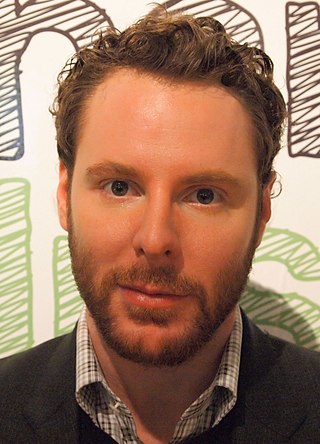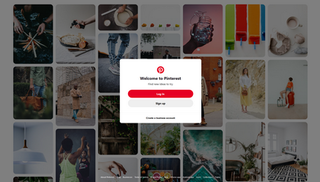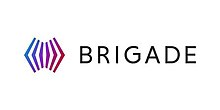
Sean Parker is an American entrepreneur and philanthropist, most notable for co-founding the file-sharing computer service Napster, and was the first president of the social networking website Facebook. He also co-founded Plaxo, Causes, Airtime.com, and Brigade, an online platform for civic engagement. He is the founder and chairman of the Parker Foundation, which focuses on life sciences, global public health, and civic engagement. On the Forbes 2022 list of the world's billionaires, he was ranked No. 1,096 with a net worth of US$2.8 billion.

Facebook is a social media and social networking service owned by the American technology conglomerate Meta. Created in 2004 by Mark Zuckerberg with four other Harvard College students and roommates Eduardo Saverin, Andrew McCollum, Dustin Moskovitz, and Chris Hughes, its name derives from the face book directories often given to American university students. Membership was initially limited to Harvard students, gradually expanding to other North American universities. Since 2006, Facebook allows everyone to register from 13 years old, except in the case of a handful of nations, where the age limit is 14 years. As of December 2022, Facebook claimed almost 3 billion monthly active users. As of October 2023, Facebook ranked as the 3rd most visited website in the world, with 22.56% of its traffic coming from the United States. It was the most downloaded mobile app of the 2010s.
Causes is a for-profit civic-technology app and website that enables users to organize grassroots and public-awareness campaigns. Causes is a website that gives summaries of breaking news, new laws, and popular topics. Users can respond, comment, share, or contact their representatives about an issue. Users can also create their own "Cause" and seek support from other users.

Facebook is a social networking service originally launched as TheFacebook on February 4, 2004, before changing its name to simply Facebook in August 2005. It was founded by Mark Zuckerberg and his college roommates and fellow Harvard University students, in particular Eduardo Saverin, Andrew McCollum, Dustin Moskovitz, and Chris Hughes. The website's membership was initially limited by the founders to Harvard students, but was expanded to other colleges in the Boston area, the Ivy League, and gradually most universities in the United States and Canada, corporations, and by September 2006, to everyone with a valid email address along with an age requirement of being 13 or older.
Graphicly was a platform for publishers which offered work flow integration, self-publishing, digital distribution, conversion, and promotion for digital content. Launched by Kevin Mann and Micah Baldwin, the website was initially a platform for digital comic books, but later added support for children's books, art books, and magazines. Graphicly accumulated more than 3,500 publishers and more than 10,000 independent creators. The website hosted an active social community, allowing creators and fans to interact directly. Graphicly shut down in May 2014, and some of its key staff moved on to fellow digital publisher Blurb.

Pinterest is an American image sharing and social media service designed to enable saving and discovery of information like recipes, home, style, motivation, and inspiration on the internet using images and, on a smaller scale, animated GIFs and videos, in the form of pinboards. Created by Ben Silbermann, Paul Sciarra, and Evan Sharp, Pinterest, Inc. is headquartered in San Francisco.
Airtime was a group video, audio and text chat app available on iOS, Android, and Desktop. Users have the ability to communicate with voice calls, video calls, text messaging, media and files in public or private group chats called "rooms". It originally launched to the public as a web product on June 5, 2012. It relaunched in April 2016.
Votizen is a consumer technology company that is developing an online network of voters in the United States. Based in Mountain View, California, the site allows its members, which it calls "Votizens", to learn about issues and elections, and take collective action with other committed voters through social media. Votizen verifies that each voice belongs to a real voter in the real world. As of 2012, Votizen had mapped out over a million connections between voters on Votizen. It was acquired by activism platform Causes in 2013.

Tilt.com, Inc. was a crowdfunding company founded in 2012 that allowed for groups and communities to collect, fundraise, or pool money online. James Beshara and Khaled Hussein launched the platform under the name Crowdtilt out of Y Combinator.
Wanelo is an e-commerce company headquartered in San Francisco’s SoMa district. It was founded in 2012 by Deena Varshavskaya.
Civic technology, or civic tech, enhances the relationship between the people and government with software for communications, decision-making, service delivery, and political process. It includes information and communications technology supporting government with software built by community-led teams of volunteers, nonprofits, consultants, and private companies as well as embedded tech teams working within government.
This is a timeline of Pinterest, an Internet service that serves as a "visual discovery tool", as well as the eponymous company.
Politics and technology encompasses concepts, mechanisms, personalities, efforts, and social movements that include, but are not necessarily limited to, the Internet and other information and communication technologies (ICTs). Scholars have begun to explore how internet technologies influence political communication and participation, especially in terms of what is known as the public sphere.

Yury Melnichek a tech-entrepreneur, venture investor and software engineer. Born in Minsk (Belarus), lived in Switzerland for more than 16 years and now living in Cyprus. Founder of a free cartographic service Maps.me, AIMATTER company, Vochi. In December 2021, together with Anna Melnichek, founded an investment company Melnichek Investments to invest in promising machine learning and biotech startups. Apart from investment activities Yury provides consulting services in venture investment, mobile applications marketing and also consults IT-companies and startups working with machine learning, computer vision and data science.
Countable Corporation is a Software-as-a-Service (SaaS) company based in San Francisco. The company was founded in 2013 by its CEO Bart Myers.
Resistbot is a service that people in the United States can use to compose and send letters to elected officials from the messaging apps on their mobile phones, with the goal being that the task can be completed in "under two minutes". It identifies a user's federal, state, and city elected officials, then provides an electronic service to deliver to those officials, as well as to local newspapers, and to publish online. As the platform has developed, Resistbot has added functionality such as confirming voter registrations, locating town halls, finding volunteer opportunities, and locating polling places. Resistbot has been funded by over 24,000 small-dollar donations as of September 12, 2017, and is built and maintained by volunteers.
Civic technology is technology that enables engagement and participation, or enhances the relationship between the people and government, by enhancing citizen communications and public decision, improving government delivery of services and infrastructure. This comparison of civic technology platforms compares platforms that are designed to improve citizen participation in governance, distinguished from technology that directly deals with government infrastructure.
Voatz is a for-profit, private mobile Internet voting application. The stated mission of Voatz is to "make voting not only more accessible and secure, but also more transparent, auditable and accountable." The company is headquartered in Boston, Massachusetts.

Matthew William Mahan is an American politician and tech entrepreneur, now serving his first term as the Mayor of San Jose. He previously served as the District 10 Councilmember representing the Almaden Valley, Blossom Valley, and Vista Park neighborhoods. Mahan also served as the co-founder and CEO of Brigade Media, a tech company focused on civic engagement.
Area 120 is Google's in-house incubator in which employees work on 20% Project product ideas. It has helped develop Gmail, AdSense, Google News, and Google Cardboard.







